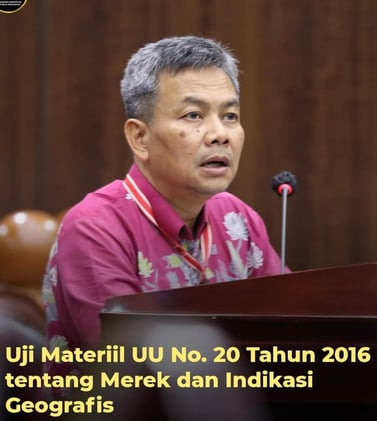Trademark Cancellation In The Context Of Legal Protection For MSMES Post Constitutional Court Decision No. 144/PUU-XXI/2023
4 min read


Constitutional Court Decision No. 144/PUU-XXI/2023: A Constitutional Victory for MSMEs
Prior to Constitutional Court Decision No. 144/PUU-XX1/2023, Article 74 of Law No. 20 of 2016 concerning Trademarks and Geographical Indications (Trademark and Geographical Indications Law, or UU MIG) stipulated a three-year period for the cancellation of unused trademarks. This short period, in practice, often imposed a heavy burden on MSMEs. Why? The trademark registration process alone can take up to two years. This meant that after their trademarks were registered, MSMEs had only a brief window to commercialize their products and demonstrate formal trademark use. However, MSMEs typically operate with limited capital, human resources, and flexible management patterns, which are not always as agile as large corporations. They are the backbone of our economy, contributing over 60% of the national GDP and absorbing 97% of the workforce. Forcing them to meet "use" standards within three years constituted a structural injustice.
Therefore, Constitutional Court Decision No. 144/PUU-XXI/2023 is a historical milestone we should be proud of. Through this decision, the Constitutional Court explicitly recognized the operational realities of MSMEs and provided an additional two years, which are critically vital. Five years is a far more realistic and equitable period for MSMEs to consolidate their businesses, develop products, and market their brands to demonstrate sufficient use. This is a clear reflection of the spirit of the people's economy (ekonomi kerakyatan) that mandates protection for vulnerable groups and ensures a more balanced business competition.
Even in recent cases, such as in Commercial Court of Central Jakarta Decision No. 79/Pdt.Sus-HKI/Merek/2024/PN Niaga Jkt.Pst involving TikTok Ltd. versus Fenfiana Saputra, the existence of Article 74 with this five-year period is crucial. Although Fenfiana Saputra's "TIK TOK" trademark was subject to a cancellation lawsuit, the Constitutional Court's decision to extend the deadline to five years provides stronger protection for Fenfiana Saputra and other MSMEs. If the period had remained at three years, the potential for more MSME trademarks to face cancellation lawsuits would have been significantly higher. This demonstrates that Article 74, with its adjusted five-year period, remains an important and effective legal instrument for maintaining trademark registration discipline while still supporting MSMEs.
The Essential Role of Article 74 (Five Years) in Trademark Law Balance
With the five-year period, Article 74 of the UU MIG now stands as a more prudent and supportive policy for the MSME ecosystem:
Promoting Active Trademark Use: This provision fundamentally encourages trademark owners, including MSMEs, to genuinely use their trademarks in commerce. It prevents the phenomenon of "sleeping rights" (trademark squatting or hoarding), where trademarks are registered without an intention to use, which ultimately hinders innovation and healthy market competition. A five-year period provides sufficient incentive for MSMEs to develop their businesses.
Providing Legal Certainty for Third Parties: With a clear time limit, interested third parties gain certainty regarding when a trademark can be challenged for cancellation if it remains unused. This supports the efficiency of the trademark registration system and ensures that trademark space is available for serious business actors.
Aligning with International Best Practices: The extension to five years also harmonizes our provisions with practices in many developed countries, which often have stronger economies yet grant longer non-use periods (e.g., Singapore, Germany, the UK, Switzerland, Norway, and Russia). This signifies that our policy is now more aligned with global standards of fairness.
Further Recommendations to Maximize the Constitutional Court Decision
While Constitutional Court Decision No. 144/PUU-XXI/2023 is a monumental victory, continuous efforts are needed to ensure its optimal implementation and ongoing support for MSMEs. Some strategic recommendations for the future include:
Enhancing Legal Literacy and Assistance for MSMEs:
The government and relevant institutions should intensify practical and easy-to-understand legal education programs on the importance of trademark registration and maintenance for MSMEs. The content should be tailored to various MSME sectors.
Proactive legal assistance programs, from registration to trademark monitoring, should be made available at affordable or even no cost.
Optimizing Accessibility of the Trademark Protection System:
Development of an integrated digital platform specifically for MSME trademark services with a simple and user-friendly interface. This platform should include simplified registration features, real-time trademark status monitoring, AI-powered chatbot consultation services, and a comprehensive public database of trademark rights.
Ensuring that digital footprints of MSMEs (e.g., social media activity, e-commerce transactions) are legally recognized as valid proof of trademark use, thereby reducing reliance on costly physical surveys.
Strengthening Supporting Institutions and Infrastructure:
Establishing a specialized unit or desk within the Directorate General of Intellectual Property (DGIP) focused on MSME trademark services and protection, staffed with personnel who deeply understand the unique characteristics of MSMEs.
Fostering strong collaboration among the DGIP, the Ministry of Cooperatives and MSMEs, MSME associations, and the legal community to create a comprehensive support ecosystem for MSME trademarks.
Conclusion: Upholding Trademark Justice for National Progress
Constitutional Court Decision No. 144/PUU-XXI/2023 serves as a robust foundation for trademark protection efforts benefiting MSMEs in Indonesia. This decision reflects a constitutional commitment to realizing social justice and equitable economic distribution as mandated by Article 33 of the 1945 Constitution and the Pancasila values. By maintaining the five-year period in Article 74, we uphold trademark discipline while providing necessary flexibility for MSMEs. Coupled with improved digital systems, enhanced legal literacy, and strengthened institutional support, we can cultivate a trademark legal ecosystem that is not only competitive globally but also inclusive and just for all national economic actors.
